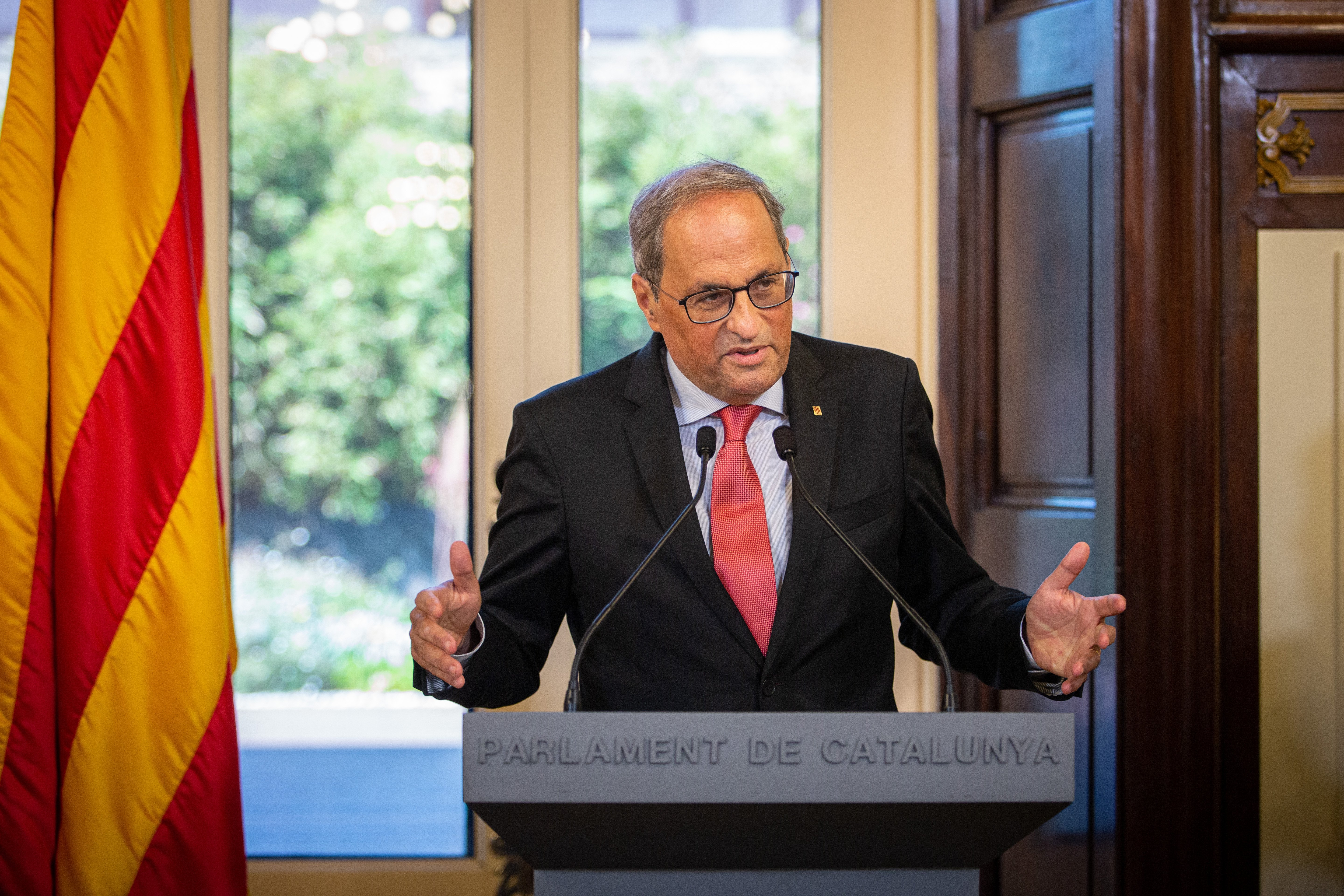Devastating. That is the strength of the arguments presented in the two dissenting opinions delivered by Constitutional Court judges Juan Antonio Xiol and Ramón Sáez, in their opposition to the court's majority ruling denying the appeal by Catalan president Quim Torra, against the sentence which stripped him of office and of his MP's seat in 2020 for not withdrawing a banner calling for the release of political prisoners. Today the court made public the detail of its decision and the two dissenting opinions. Specifically, Xiol, who is vice-president of the Constitutional Court, states that he has "well-founded doubts" that Torra's banning from office complies with the principle of proportionality in relation to the right of access to public office, and therefore asks his court colleagues to open an internal procedure to raise a question of unconstitutionality of the article of the Penal Code that includes the disqualification from office, delimited specifically to the case of Torra, because the law "does not include a modulation or weighting" of such disqualifications. For his part, Sáez endorses Xiol's opinion and adds that, as Torra alleged, his right to an impartial judge had been violated, with reference to judge Jesús Maria Barrientos, the president of the Catalan High Court which tried him, for having made statements against the Catalan independence process and then judging one of its leaders. And this opinion also questions why he was removed from his status as an MP when the action for which he was convicted was as president of the Generalitat.
In particular, Xiol states that, despite the force of the argument put by the majority position, it fails to clarify the doubts he has, from a perspective of the principle of criminal proportionality, over the "automatic and unfailing" disqualification from public office established in the Penal Code for this offence. He adds that a proper reading of the Spanish constitutional court and European jurisprudence must be made, with respect to the principle of criminal proportionality, as a mandate addressed to the legislator, as was also noted already in the dissenting opinions (Xiol's being one such opinion) over the long prison sentences for sedition given to the Catalan pro-independence leaders in the 2019 trial.
For his part, the other dissenting judge, Ramón Sáez, explains two reasons for unconstitutionality in the judgement against president Torra. The first is the effect on the fundamental right to an impartial judge in relation to the judge who presided over the trial court, accepting as reasonable and legitimate the doubt expressed by Torra's appeal about that judge's institutional position. Saéz states that the judge, Jesús Maria Barrientos, had taken part in the decision to admit the complaint and, in his capacity as president of the High Court of Catalonia had also given an opinion at a press conference on the decision of the Central Electoral Commission to remove the symbols from the Catalan government buildings - the central matter on which Torra's failure to comply led to the sentence for disobedience. In addition, in an event held by the Bar Association of Barcelona this judge expressed his rejection of the use of the expression "political prisoners" by the then-speaker of the Catalan Parliament, Roger Torrent and even left the room - these same words being the slogan incorporated, along with a yellow ribbon symbols, in the banner that was the subject of the trial, at which it was debated if the freedom of expression gave coverage to the action of the defendant. The judge Sáez states that in order to guarantee the fundamental right to an impartial judge and to exclude any shadow of bias, there exists a theory of appearances, accepted as a standard of adjudication in international instruments on the status of the judge, in order to strengthen public confidence in courts and to promote the image on the absence of bias in the judge hearing the case.
The second point of unconstitutionality asserted by Sáez is that the sentence affects the right to criminal legality, from the perspective of the proportionality of the sentence determined by law, given the unjustified broadening of the ban to affect not just his position as president of Catalonia, but also entailing the loss of his seat as a Catalan MP and the inability to obtain any another position of representation at all levels - local, regional, state and European. "Since it was not his parliamentary office that was used to commit the disobedience, the conviction was unpredictable," the judge concluded.
Banned over a banner
The events for which president Torra was tried took place in March 2019, and consisted of Torra's refusal to comply with the "repeated" demands of Spain's Central Electoral Commission (JEC), in his capacity as Catalan president, which ordered him to remove a banner reading "Free political prisoners and exiles" (in English and Catalan), hung on the balcony of the government's Palau de la Generalitat building, an element which was considered to be "a symbol identifiable with certain political options", and thus in breach of the principle of neutrality imposed on all public authorities, and particularly in election period. President Torra still has to face a second trial for not removing the banner in 2019, this time ordered by the Catalan High Court, not the JEC, which will be held in an ordinary criminal court in Barcelona on March 17th. Given that Torra is no longer a public office holder, the hearing will not take place in a higher court.

